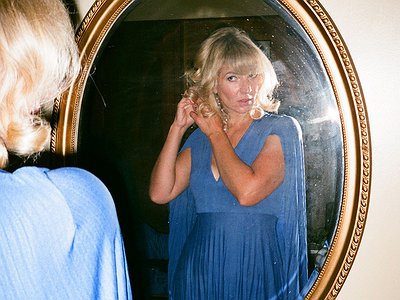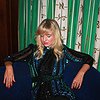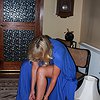What were your main compositional- and production-challenges in the beginning and how have they changed over time?
When I first started playing and recording myself, every aspect was an improvisation. My first recording devices were the Fisher Price cassette recorder then later the Tascam 4-track then later I used DAT, minidisc, digital 8 track recorders. I love playing rather than getting bogged down with recording techniques/production so my early approach was always just press record and see what happens. Often, I was lucky, the recordings came out well, but I inevitably there were the “ones that got away” because I hadn’t set levels properly and so on. Fast forward and over the past few years especially, I’ve been working in studios and prefer that experience for a finished album. It’s a bit of a mindfuck for me to play and have to worry about levels/recording constraints at the same time, it stifles the music, so now, I like to leave the recording to the professionals so I can get on with my thing as uninhibitedly as possible.
Compositionally, even if you listen to my earliest work both solo and in collaboration you can hear my approach has always been to find form, call it what you like, but for me, “spontaneous composition” is a fitting term and often my song work is still born first through improvisation and even in fully improvised music like what I play in my duo with Peter Brötzmann, is compositional, I’m not a fan of a type of attention-deficit, flailing about improvisation that never goes anywhere. When younger, I did have a somewhat naive idea that if I focused too strongly on composition that it was somehow less pure, that the music had to surge through me like a bolt of lightning in its fullest form otherwise I was betraying myself and the music, but I don’t feel that way anymore. The more I’ve worked through the years, the more I’ve recognised how composition can spring forth from anywhere - a simple lyric/thought in my notebook, a tiny melody that bubbles up while I’m doing dishes, and the process of really WORKING on something small to turn it into something bigger, has become an obsessive pleasure for me.
What was your first studio like? How and for what reasons has your set-up evolved over the years and what are currently some of the most important pieces of gear for you?
I’ve always lived in rather small apartments so inevitably, my studio has been my bedroom, it still is today! While I craft my finished albums in proper recording studios now, at home, I’ve got my steel set up for daily playing and a tiny Blackstar amp that I can plug headphones into so I don’t drive my neighbours crazy. Around me I have an abundance of books, art, photography and personal objects that make the space feel comfortable and inspiring.
How do you make use of technology? In terms of the feedback mechanism between technology and creativity, what do humans excel at, what do machines excel at?
My personal approach to technology is, less is more. If I’m confronted with too much technology, especially in the songwriting process or recording process, the abundance of choice technology offers is too much for me, I could easily get sucked into a wormhole of manipulating details in post-production or adding effects to my pedal steel and so on that takes me further away from the source of the work, it clouds my vision and disrupts my flow. I like to keep things simple. I’m reminded of a talk I saw recently with the artist Sophy Hollington. Her medium is linocuts that are then coloured on the computer. She describes herself as a person that can dabble so much that the linocut forces her to make a quick decision and stick with it, she doesn’t like to manipulate much on the computer aside from adding colour. I resonate with that. The more choice you put in front of me, the more frozen I become. I feel the same way in an American supermarket in the cereal aisle, I grab the oatmeal and get out of there before I’m stuck staring. And it extends to the way I use the internet, social media, the way I consume news, I find too much exposure to the noise of the world filtered through technology hinders my creativity. I’d rather read a newspaper or better yet, experience as much as I can through direct encounters with different parts of the world, different people, different landscapes. A great attraction of touring for me is traveling and experiencing first hand. I can’t fully trust what comes to me through a technological filter. I think I still have somewhat of a mindset that you could hand me a board with a piece of string on it and I’ll play something interesting, that’s the goal.
This summer while in France for a month, I regularly visited a small village cafe that was much more that just a cafe, it was the hub of the village life. Everyone knew each other, all sorts of ages and backgrounds, though in general I found most of the people quite eccentric and extremely open. The owner and I were fast friends and soon ‘brother’ and ‘sister’ and he demanded I sing for the patrons. I felt more nervous playing to this small group of people than to an audience of 500 people somehow. I had to quickly figure out how to play one of the songs off my last album ‘I Abused Animal’ on acoustic guitar which is tuned completely differently to my pedal steel and is an instrument I never play. I surprised myself how I was able to do that without really understanding the mechanics of transposing to another instrument (not thinking in notes or scales etc.) though as the days went on in village life in France, it was common that at every gathering someone would pick up a guitar and start singing covers - Neil Young, etc. and I’m not able to join in with music in that way, it got me contemplating why this is? Why, if I’m playing music, does it have to be this serious thing of composition & performance, I can’t just bust out with a tune at a party and I actually find something about the idea of me playing any ol’ tune awkward yet I admire the ability in other people. Of course, I’m speaking from personal experience. While I’m not a studio musician, I have a great admiration for musicians that do get heavily involved in the studio, pioneers like Chris Carter & Cosey, I love Conrad Schnitzler who obsessively worked all day and night in the studio and who would probably describe his music as more machine than human but for my taste, I have to hear the human come through the machine. Artists like Schnitzler or OMIT from New Zealand, through all of this machinery and technology (even if not ‘modern’ technology) the humanness shines through, I feel such emotional depth and complexity from both of these artists’ music.
Of course that brings up another discussion of how much I’m projecting onto these sounds. I had somewhat of an argument with Keith Rowe once where he said emotion and expressiveness had no place in his music while those were two adjectives I might have used to describe my work. But was I describing the work or me? I could argue that especially as a Pisces, everything I interact with is with an emotional filter. And I argued with Rowe that even if in his mind AMM weren’t projecting emotion, that as a listener I’m still feeling it so he doesn’t have control of that. And then we laughed that these type of musical discussions can be like splitting hairs so we had a better time dancing instead.
Production tools, from instruments to complex software environments, contribute to the compositional process. How does this manifest itself in your work? Can you describe the co-authorship between yourself and your tools?
Again, I keep things simple. Probably the most important two tools in my arsenal in a way are my little notebook and my handheld recorder. If a phrase, idea, inspiration, passage in something I’m reading, anything at all that seems to light a spark in me compelling me to note it down, then I listen to that feeling and take note. Same with a melody, often a song will come to me while I’m walking most especially, one of life’s greatest pleasures, and I record it because it comes and goes so quickly, I’ve learned with dreams, with sounds, with phrases, however much you think you won’t forget it, it feels burned on your psyche in the moment, If you don’t capture it then and there, it disappears.
In my younger years when I was making a living doing freelance graphic design, I knew all the software, a bit of a contradiction to what I’ve said about technology because I actually loved working with design and layout software, designing websites, making posters, etc. but even when I was using the software, I still had to have a hands-on approach as part of the process so I’d draw by hand then scan it in or cut up elements on paper and lay it out on my living room floor before committing it to the computer. I haven’t worked with design software in some years, so it was nice to design the cover of my new album and realise I could easily pick up the tools again but when it comes to sound, I’ve never used Ableton or Garageband of any tool for writing songs, I’d get caught up in the software itself rather than how it could help with the music. So the notebook, the handheld recorder and just sitting behind the pedal steel and playing are still the key elements of my compositional process.
Collaborations can take on many forms. What role do they play in your approach and what are your preferred ways of engaging with other creatives through, for example, file sharing, jamming or just talking about ideas?
I could be wrong, but I don’t think I’ve ever collaborated remotely, through file sharing or even someone giving me a piece of music that I overdub, I’ve had offers and have even been given pieces to contribute to, one comes to mind that I somehow regret is Jason Bill and Jack Rose’s album that they asked me to sing on. It doesn’t feel natural to me. The collaboration is more than the sound, it’s the person, how they physically interact with their instrument, their style & smell, their listening or not, the space between us in the room, all the silent interaction occurring that we don’t know about … that all is part of the music to me and without the personal interaction, I don’t feel it. I’ll say this though! My reluctance to or resistance to or THINKING about some of these approaches I supposedly don’t do makes me think well, why not? The experimenter in me thinks I should try everything in this interview I’ve said isn’t part of my approach … what could I be missing???
Outside of collaborating with other musicians, I do, particularly in my solo work, like to bounce off ideas with a very small circle of trusted friends. Jennifer Lucy Allan was my spiritual advisor during Throne and it truly was a spiritual advisement, so not just fine-tuning lyrics and arrangements during the recording process, but helping to usher me past self-doubts, uncertainties, moods. I’ll openly admit a good cry is always part of the process at some stage, solo work can be such a lonely place, looking in a mirror, trying not to overthink, yet inevitably coming to a place where you question everything and you’re so caught in a web of your own that to have someone cut through the bullshit and just give you an objective opinion is invaluable.
I don’t work in a vacuum. And especially with my last 2 albums, a sensitive recording engineer is crucial. John Hannon who recorded and engineered Throne, very intuitively made production decisions while we were recording that helped further shape some of the songs and he understood what I was trying to achieve without my having to talk specifically in musical terms, he just did his thing rather silently and I trusted his decisions. It can be a vulnerable place in the studio, the feeling is not the same as a live gig, it can be awkward which can make it more difficult to conjure so you need to have the space to just focus on the work and not worry about the technical side of the recording.





